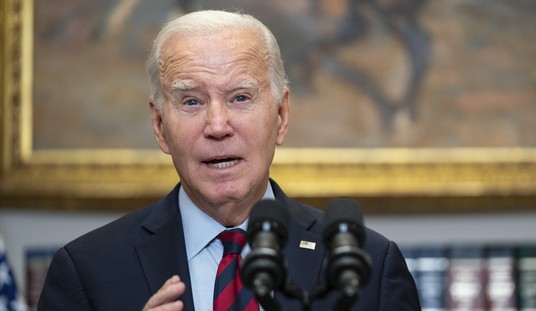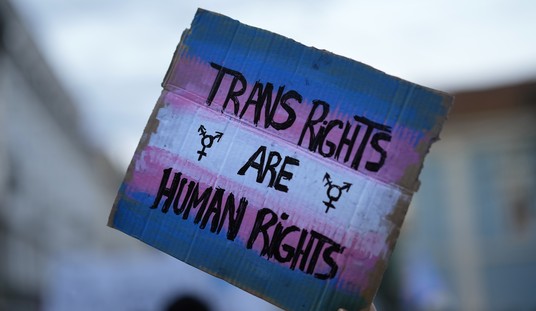The Virginia governor’s race was yet another example of the massive voting gap in a huge demographic: single people, particularly single women. According to exit polls, Republican Ken Cuccinelli won handily on the “hard” issues facing Virginia voters, and won most other demographic slices, but Democrat Terry McAuliffe won big with single people, crushing Cuccinelli by nearly fifty points among single women.
A similar dynamic could be observed in the 2012 presidential race, where the Obama campaign made a very concerted effort to win over single women – so concerted that it sometimes appeared ludicrously clumsy to critics. Rush Limbaugh recalled the much-lampooned “Life of Julia” web ad on his radio show Thursday, in which an imaginary single gal lives her entire life with the assistance of cradle-to-grave Obama social programs… but never the slightest hint of a husband, even when she has a child.
Rarely has such obvious pandering been flung at a targeted demographic by the shovelful, but evidently the single female demographic doesn’t mind obvious pandering. It seems impossible to patronize them to the point of irritation, not even during the equally ridiculous Sandra Fluke saga, in which the nominal cost of birth control was transformed into a civil-rights tragedy by a professional activist posing as a student… an activist who later admitted she didn’t know how much birth control actually cost, after rising to fame for touting a figure that was about 1000 percent high. The whole thing was comically, transparently artificial, but it worked like a charm.
The single female demographic doesn’t get hung up on details. Another of the new liberal icons, Wendy Davis of Texas, couldn’t answer basic questions about the abortion legislation she opposed with a purportedly heroic filibuster. Now she’s claiming she is actually kinda sorta “pro life” when you think about it. This is true of all the emotional appeals directed at single female society – lack of knowledge is not only overshadowed by passionate conviction, it can be a point of pride. Critics who dwell on the fine print are portrayed as somehow dishonest, using tricksy legalistic nitpicks to injure great idealistic crusades. The liberal hero of the hour cares so very, very much that they cannot be bothered to learn what anything costs, or explore the ramifications of the laws they champion.
Soothing assurances are taken at face value, with the help of media “fact checkers” who suddenly forget basic math and reasoning skills. “If you like your plan, you can keep your plan, period!” It’s surreal to recall, in the middle of the ObamaCare meltdown, that one of the program’s major selling points was how it would make life easier on everyone. It was supposed to be trouble-free, inconveniencing no one, bringing one-click online shopping convenience to the intimidating business of purchasing health care. Never mind that for better than 80 percent of the population, health care was something that comes more or less automatically with employment.
That’s another thing about the single female society: it’s not just a matter of dependents voting to preserve or increase their personal benefits. They are highly receptive to the notion of government-managed compassion, fearful of the cold terrors of the predatory wasteland that lies beyond the comforting light of Mother Government’s home fire, even when they personally are not much affected by particular policies. The government “shutdown” became a big deal to people who were not personally affected by it at all. Single women with comfortable careers and excellent benefits found the ObamaCare sales pitch appealing because they were thinking about the 30, 40, or 50 million people who were supposedly suffering without health insurance. As long as the voter was not personally expected to make any great sacrifice on behalf of these folks, why not support a benevolent Big Government program that would force evil insurance companies to take care of the uninsured?
Single women don’t seem to feel a great sense of connection with married women. Not only do they vote very differently, but they weren’t much dismayed when Obama advisers savaged Mitt Romney’s wife as an out-of-touch stay-at-home mom, a mistake that initially seemed to dynamite the entire “War on Women” narrative Democrats had worked so hard to build. The single female demographic is also remarkably comfortable with famous instances of infidelity by Democrat politicians. Maybe it’s just that they don’t really expect anything better from men.
Or maybe it’s because they’ve internalized the crucial left-wing idea that politics define character. It doesn’t matter how a political leader conducts his personal affairs; it matters how he votes. Feminists who pushed sexual harassment as the great social crisis of the early Nineties were heard to remark that Bill Clinton could diddle all the interns he wanted, as long as he voted for abortion rights. Likewise, the Left is very eager for people to believe that government has a monopoly on compassion. Nothing matters unless the State funds, compels, or manages it. Individuals and private concerns cannot be trusted to do the right thing. One convenient benefit of this philosophy is that civic duty can be fully discharged by voting the “right way.” When you vote for someone who says they care about an issue, and will use government power to address it, you have completed the sacred compassion ritual at the sacred altar of the ballot box.
For similar reasons, tales of foolish error, and even outright corruption, by people who presumably meant well are less damaging than they should be. If important social issues can only be addressed by compulsive government action, no degree of failure will ever mean that government shouldn’t be given another chance. Intentions completely supersede results… and that includes the supposedly heartless and selfish intentions of private entities.
The only big misfire in the Democrats’ perfectly targeted appeal to the single-woman society has been gun control, which hasn’t quite worked out the way they imagined it would. I would wager it probably has net positive appeal to this demographic in many areas of the country, but single women also have serious concerns about personal security. This is one reason the gun-control push tends to target the sort of weapons they would never use, the scary “assault rifle” ironmongery. In the abstract, the idea of taking fearsome weapons away from bad people sounds great, but it falters badly when it menaces the individual right of self-defense.
On the other hand, you’ve got abortion, an almost perfectly polarizing, highly-effective issue. The country in general might be moving in the pro-life direction, particularly with respect to late-term procedures, but for the single female demographic, abortion connects powerfully with the sense of personal freedom. This includes the great number of single women who have never even considered having an abortion. The idea of being abandoned to raise an unwanted child is understandably fearsome to them. It’s not an irrational or absurdly hypothetical fear. In a world where marriage and fidelity have lost their value, but sexual activity is encouraged at increasingly tender ages, it’s an all-too-common occurrence. Opponents of abortion on demand have been demonized on terms that make them appear comprehensively hostile to unmarried women.
It is not coincidental that left-wing policy has deliberately nourished this type of society for generations. The Left does not like intact, independent families who retain control over their children, and proudly make it through life without the assistance of the State. It does not like people who value liberty and opportunity over tangible benefits. Nearly every ounce of legal and cultural pressure exerted by the Left for decades has encouraged the ideal of perpetual, single adolescence for young men and women. A great deal of environmentalist theory is directed at making people feel guilty about having the sort of large families that are crucial to population growth, economic growth, and a successful independent society. Even ObamaCare has a stiff marriage penalty – which, according to a story by CBS News today, has already led at least one couple to consider divorce. Polls show that young people in the middle and lower income segments view marriage as one of the very last things on the great checklist of life, something to be considered after careers have been built, and even after children have been born.
Of course, all of the above might sound annoying to the single female reader of these words, especially since readers of this website probably don’t fit the described demographic profile at all. Broad generalizations always have plenty of individual exceptions, but the Democrats have been doing very well at the polls by weaponizing this particular generalization. A good feature of any truly successful pander is that critics are made uncomfortable about discussing it, fearful that they will be accused of stereotyping. If men aren’t supposed to speak up about this situation… well, that’s half the country intimidated into silence.
It’s hardly a mindset restricted to single women, of course, but appeals pitched in this way seem to be remarkably effective. On the other hand, they don’t seem very perturbed by talk of fiscal irresponsibility, looming debt crises, collapsing opportunities for entrepreneurial risk, the loss of seemingly abstract freedoms, or the fine points of legal restriction upon benevolent power. Look at how readily they accept the concept of “jobs” as something wise government officials are more eager to bestow than would-be employers.
How can conservatives adjust their strategy to appeal more strongly to the single female society? Well, one obvious approach would be restricting the vote to people who are married. That’s probably not going to fly. It’s hard to imagine anything that would more strongly indicate society’s strong respect and need for stable marriage, though. Since we’re well along the road to allowing anyone to marry anyone else, no one except people who are already too young to vote would be presumptively excluded. We could work in a generous grace period for people who have exited a marriage. Those who accept the notion of government as “the one thing we all do together,” the collective benevolent expression of popular will, should admit that married couples tend to be more community-minded, they’re generally more likely to own property, and they’ve got more time and financial resources to invest in community endeavors. (One reason I’ll never run for office is that I could never get away with leaving a trail of paragraphs like that behind me.)
Sacrificing principles to pander is not the right approach, but principles can be presented in many different ways. Personalizing issues – bringing forth “real people” to talk about how their lives have been directly affected – is an important step, because it shifts the conversation away from abstract topics, grounding it in daily life. There’s a good reason the Left strove mightily to ignore the Kermit Gosnell abortion horror. It doesn’t want people to think about actual lives ruined, individual living human beings brutalized. It doesn’t want to defend the ugly reality of clinics that are presented as shrines of personal freedom in the abstract. Similarly, no gun-control activist wants to debate a flesh-and-blood woman who defended herself from brutal assault with a firearm. Talk about entrepreneurs, yes – but also talk about the people who get jobs from them, and the people whose lives are improved by the services they offer.
Do you recall President Obama’s “#40Dollars” campaign? The website is still online, just like the one that repeats Obama’s Big Lie: “For Americans with insurance coverage who like what they have, they can keep it. Nothing in this act or anywhere in the bill forces anyone to change the insurance they have, period.”
The 40 Dollars campaign was Obama’s campaign to keep his “payroll tax cut” (actually a raid on Social Security funding) in effect throughout 2011 and 2012. He later unceremoniously dropped this once-sacred “tax cut” during the fiscal cliff chaos at the end of 2012, with hardly a peep from anyone.
But when he was pushing hard for this policy, he wanted Americans to send him anecdotes about how losing $40 per paycheck would ruin their lives. “The thing is, $40 is real money for working families, as people all over the country told us,” the White House website declared. “That money buys things like school lunches, the gas needed to get to work or visit ailing relatives, and co-pays for doctor visits and essential prescription medicines.”
And now the same White House tells you to shut up and take your medicine when your insurance premiums triple. Mournful anecdotes about the uninsured were used to push the ObamaCare fraud; the same people could not care less about the people facing financial ruin or loss of insurance coverage due to ObamaCare. They understand the power of personalized narratives. The dissonance between what they used to say, and what they’re saying now, is big enough to break a demographic stranglehold.
Update: I didn’t realize that my colleague Teresa Mull at Human Events was planning to write on the same topic, and she wasn’t aware that I was writing this, but we ended up hitting some of the same notes. Her conclusion is forcefully stated: “So what do single women want? Basically, the Democratic Party is the rich older sleaze who promises you the world but can only deliver superficially. The Republican Party is the loving father who shows you your self worth, values your potential, and teaches the (wo)man to fish. You can do better, ladies.”













Join the conversation as a VIP Member